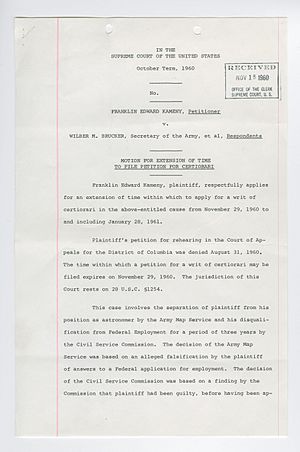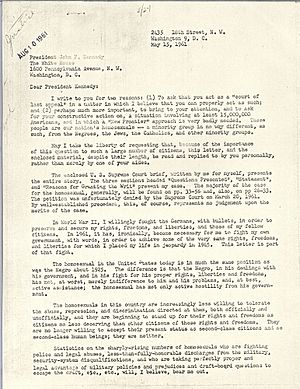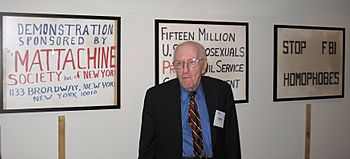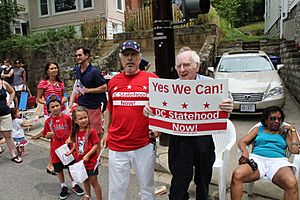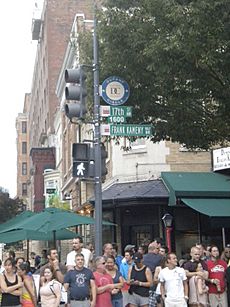Frank Kameny facts for kids
Quick facts for kids
Frank Kameny
|
|
|---|---|
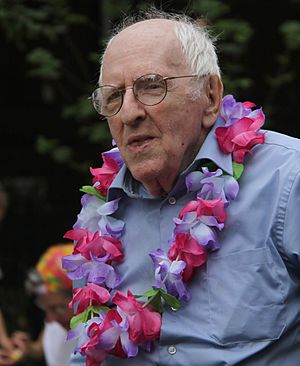
Kameny in 2010
|
|
| Born |
Franklin Edward Kameny
May 21, 1925 New York City, U.S.
|
| Died | October 11, 2011 (aged 86) Washington, D.C., U.S.
|
| Education | Queens College (BS) Harvard University (MS, PhD) |
| Known for | Gay rights activist Fired for being gay by the U.S. Civil Service Commission Co-founder of the Mattachine Society |
| Scientific career | |
| Fields | Astronomy |
| Thesis | A Photoelectric Study of Some RV Tauri and Yellow Semiregular Variables (1956) |
| Doctoral advisor | Cecilia Payne-Gaposchkin |
Franklin Edward Kameny (May 21, 1925 – October 11, 2011) was an American activist who fought for the rights of gay people. Many people call him "one of the most important figures" in the movement for gay rights in the United States.
In 1957, Kameny was an astronomer working for the U.S. Army in Washington, D.C. He was fired from his job because he was gay. This event led him to start a huge effort to challenge the government. His actions helped kick off a new period of strong activism for gay rights in the early 1960s.
Kameny officially challenged his firing by the U.S. Civil Service Commission. He did not win his case, but it was very important. It was the first time someone tried to claim civil rights based on their sexual orientation in a U.S. court.
Contents
Early Life and His Fight for Fairness
Frank Kameny was born in New York City. He went to Richmond Hill High School and finished in 1941. At age 16, he started studying physics at Queens College. He joined the United States Army during World War II and served in Europe. After the war, he returned to Queens College and earned his degree in physics in 1948.
Kameny then went to Harvard University. He earned his master's degree in 1949 and his doctorate (PhD) in astronomy in 1956. His main project was about studying certain stars.
After finishing his studies, Kameny moved to Washington, D.C. He taught astronomy at Georgetown University for a year. In 1957, he was hired by the U.S. Army Map Service. When his bosses found out he was gay, they questioned him. Kameny refused to give them information about his personal life. Soon after, he was fired. In 1958, he was also banned from working for the federal government in the future.
Kameny fought his firing in court. He lost twice before asking the U.S. Supreme Court to review his case. The Supreme Court chose not to hear it. After this, Kameny dedicated his life to activism. He never held a paid job again and was supported by his friends and family. He often said, "If I disagree with someone, I give them a chance to convince me they are right. And if they fail, then I am right and they are wrong and I will just have to fight them until they change."
Kameny believed that everyone was simply "human." He always listed his race as "human" throughout his life.
Leading the Way for Gay Rights
In 1961, Kameny and another activist named Jack Nichols started the Washington, D.C., branch of the Mattachine Society. They organized some of the first public protests for gay and lesbian people. On April 17, 1965, they held a picket line at the White House. Other groups joined them, and they protested at the United Nations, the Pentagon, and other important places. These protests became known as the Annual Reminder for gay rights. Kameny also wrote to President Kennedy, asking him to change the rules that discriminated against gay people in the government.
In 1964, Kameny pointed out that gay people faced very harsh discrimination. He said that the government did not help them and actively worked against them. He believed that as other civil rights movements gained success, discrimination against gay people might even increase. He said, "Homosexuality represents the last major area where prejudice and discrimination are prevalent in this country."
Kameny also argued that being gay could be a positive thing for individuals and for society. He later created the famous slogan "Gay is Good" in 1968. He got the idea after hearing civil rights leader Stokely Carmichael chant "black is beautiful."
Important Steps in the 1970s and Beyond
In 1971, Kameny made history by becoming the first openly gay person to run for the U.S. Congress. He ran in Washington, D.C., for a non-voting delegate position. After he lost the election, Kameny and his team created the Gay and Lesbian Alliance of Washington, D.C.. This group still works today to push for equal rights.
In 1972, Kameny and activist Barbara Gittings convinced the American Psychiatric Association (APA) to hold a debate. The debate was about whether being gay was a mental illness. During this debate, a gay psychiatrist named Dr. John E. Fryer spoke in disguise as "Dr. Henry Anonymous." He explained how being listed as mentally ill in the APA's manual affected gay people. Kameny had asked many gay psychiatrists to speak, but Fryer was the only one brave enough to do so, even if it meant hiding his identity. The next year, the APA removed homosexuality from its list of mental disorders. Kameny called that day, December 15, 1973, the day "we were cured en masse by the psychiatrists."
Kameny also helped many gay service members who were trying to get honorable discharges from the military. He looked for a gay service member with a perfect record to challenge the military's ban. He found Leonard Matlovich, a Technical Sergeant in the Air Force with 11 years of excellent service. Matlovich had even received a Purple Heart and Bronze Star. In 1975, Matlovich purposely told his commanding officer that he was gay. This led to a legal challenge.
Matlovich was discharged from the Air Force, but a federal court later ordered him to be reinstated. Matlovich chose to accept a financial settlement instead and continued his activism. Kameny was an honorary pallbearer at Matlovich's funeral in 1988.
On March 26, 1977, Kameny and other gay and lesbian community members met with Midge Costanza, a White House official. They discussed changes needed in federal laws and policies. This was the first time gay rights were officially talked about at the White House.
Kameny was also appointed as the first openly gay member of the District of Columbia's Human Rights Commission in the 1970s.
Later Years and Legacy
In November 2007, Kameny wrote a letter to journalist Tom Brokaw. Brokaw had written a book about the 1960s, but he did not mention gay and lesbian rights activism. Kameny felt that Brokaw had "de-gayed an entire generation." Brokaw later said that the gay rights movement became more active slightly later than the main events he focused on.
Kameny had heart disease in his later years. However, he kept a busy schedule of public appearances. His last speech was to an LGBT group in Washington, D.C., on September 30, 2011.
Frank Kameny was found dead in his Washington home on October 11, 2011. This day is known as National Coming Out Day. Doctors determined he died of natural causes due to heart problems.
Working for DC Statehood
In 1981, Kameny was elected as a delegate to the District of Columbia Statehood Constitutional Convention. This was a step towards making Washington, D.C., a state. He continued to support D.C. statehood for the rest of his life. He was a familiar face at his neighborhood's annual July 4 parade.
Awards and Special Recognitions
In 2006, Kameny and Barbara Gittings received the first John E. Fryer, MD Award from the American Psychiatric Association.
In 2007, the Smithsonian Institution's National Museum of American History put Kameny's picket signs from the 1965 White House protest on display. The Smithsonian now has 12 of the original signs used by gay and lesbian Americans in that first protest. The Library of Congress also acquired Kameny's papers in 2006, which tell the story of his life and leadership.
In February 2009, Kameny's home in Washington was named a historic landmark by the District of Columbia.
On June 29, 2009, John Berry, who was the Director of the Office of Personnel Management, formally apologized to Kameny on behalf of the United States government. Berry, who is openly gay, gave Kameny the Theodore Roosevelt Award, which is a very high honor.
On June 10, 2010, Washington, D.C. Mayor Adrian Fenty unveiled new street signs. They named 17th Street between P and R streets "Frank Kameny Way" in his honor.
Kameny was invited to attend the ceremony on December 22, 2010, where President Barack Obama signed the law to repeal "Don't Ask, Don't Tell." This law allowed gay people to serve openly in the military.
After Kameny's death, the giant rainbow flag in San Francisco's Castro neighborhood was flown at half-staff for 24 hours. This was a request from Gilbert Baker, who created the rainbow flag.
In November 2011, Kameny's house was listed on the National Register of Historic Places.
In January 2012, the American Astronomical Society held a ceremony to honor Kameny after his death. They recognized his "lifelong commitment to promoting equal rights for homosexual men and women." They noted how his activism removed barriers that had ended many careers.
On July 3, 2012, an asteroid was named (40463) Frankkameny in his honor.
In 2013, Kameny was added to the Legacy Walk in Chicago. This is an outdoor display that celebrates LGBT history and people.
In 2015, Kameny received a U.S. Veterans Administration memorial headstone at Washington, D.C.'s Congressional Cemetery. The headstone was dedicated on Veterans Day. In front of it is a marker with his famous slogan, "Gay is Good." Kameny once said he hoped to be remembered for coining that slogan.
In June 2019, Kameny was one of the first fifty "pioneers, trailblazers, and heroes" added to the National LGBTQ Wall of Honor. This wall is part of the Stonewall National Monument in New York City. This monument is the first U.S. national monument dedicated to LGBTQ rights and history.
The National LGBTQ+ Bar Association gives out the Frank Kameny Award each year. It honors a member of the LGBTQ+ community who has helped achieve important legal victories, even if they are not a lawyer.
On June 2, 2021, Kameny was featured on that day's Google Doodle to celebrate Pride Month.
Images for kids
See also
 In Spanish: Frank Kameny para niños
In Spanish: Frank Kameny para niños
 | Delilah Pierce |
 | Gordon Parks |
 | Augusta Savage |
 | Charles Ethan Porter |


